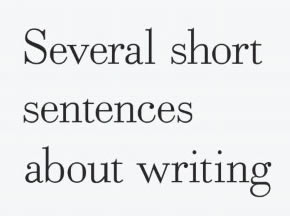Difference between Many and Several
Key difference: ‘Many’ and ‘several’ are two terms that are used to denote quantity. However, the two terms differ in the manner that they can be used. Both the terms indicate a large, indefinite amount of something. ‘Many’ is mainly used with countable nouns, such as person, apple, spoon, day, etc. ‘Several’, on the other hand, generally refers to an unspecified number of things. These can be more than two but has no upper limit. However, it is generally accepted that ‘several’ is less than ‘many’.
 ‘Many’ and ‘several’ are two terms that are used to denote quantity. However, the two terms differ in the manner that they can be used. Both the terms indicate a large, indefinite amount of something. E.g. most people, several people, most things, several things, etc.
‘Many’ and ‘several’ are two terms that are used to denote quantity. However, the two terms differ in the manner that they can be used. Both the terms indicate a large, indefinite amount of something. E.g. most people, several people, most things, several things, etc.
‘Many’ refers to a great amount of things, a large amount. Dictionary.com defines ‘many’ as:
- Constituting or forming a large number; numerous: many people.
- Noting each one of a large number (usually followed by a or an): For many a day it rained.
- A large or considerable number of persons or things: A good many of the beggars were blind.
- The many, the greater part of humankind.
- Many persons or things: Many of the beggars were blind. Many were unable to attend.
‘Many’ is mainly used with countable nouns, such as person, apple, spoon, day, etc. Countable nouns and uncountable nouns just specify whether or not the thing that the sentence is referring to can be counted or not. For example: “How much salt is in the dish?” as opposed to “How many spoons to you need?” We cannot count the salt; hence the term ‘much’ is used, while we can most certainly count the number of spoons; hence ‘many’ is used.
Examples:
- How many apples do you want?
- How many books have you read?
- How many brothers and sisters have you got?
- There are many empty chairs in the event.
- How many fruits are there on the table?
- Many children are impoverished in that region of the world.
- There are many challenges that lie ahead.
- There are many things that we can do with this.
- Many animals are migrating south in this time of year.
- How many people are in rehab?
- How many bottles of milk have you bought?
- How many pinches of salt are needed in this recipe?
 ‘Several’, on the other hand, generally refers to an unspecified number of things. These can be more than two but has no upper limit. However, it is generally accepted that ‘several’ is less than ‘many’. Generally, it is considered that ‘several’ implies to a relatively small amount.
‘Several’, on the other hand, generally refers to an unspecified number of things. These can be more than two but has no upper limit. However, it is generally accepted that ‘several’ is less than ‘many’. Generally, it is considered that ‘several’ implies to a relatively small amount.
Dictionary.com defines ‘several’ as:
- Being more than two but fewer than many in number or kind: several ways of doing it.
- Respective; individual: They went their several ways.
- Separate; different: several occasions.
- Single; particular.
- Several persons or things; a few; some.
Examples:
- Several things can go wrong with this endeavor.
- Did you buy the several things I asked you to?
- I packed several things for the trip, just in case.
- We will require several sandwiches for the picnic.
- Several people participated in the debate.
- Several people voiced their disappointment with the event.
- Several candidates were short listed for the post.
Image Courtesy: annyas.com, brainpickings.org









Comments
van necklace replica
Tue, 10/31/2017 - 04:39
Lena
Mon, 03/27/2017 - 22:39
Thank You Lena for pointing it out. It has been fixed now.
dbadmin
Wed, 03/29/2017 - 12:04
tarun sharma
Thu, 10/08/2015 - 12:11
Add new comment